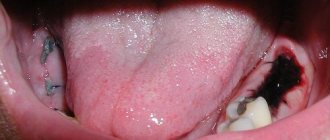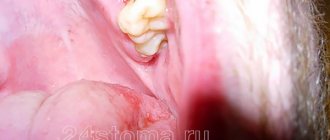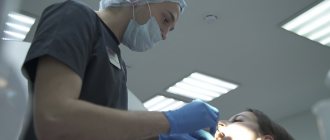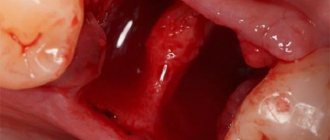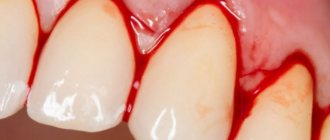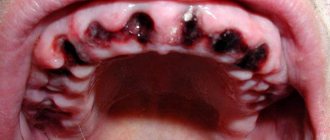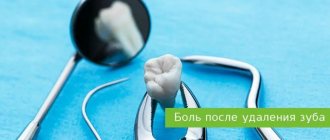Many people have to face the procedure of tooth extraction. Quite often, patients experience discomfort after removal. Unfortunately, eliminating pain does not mean complete recovery. Even if the tooth extraction was performed by an experienced specialist, after such a procedure it is imperative to follow all the doctor’s recommendations. First of all, this applies to full oral care. In addition, you need to monitor your diet. After the tooth extraction procedure, you should definitely check with your doctor how long you need to abstain from eating. Depending on the complexity of the removal, the specialist will suggest a specific time frame.
Why can’t you eat after removal?
This recommendation is due to the fact that very rough food can have a traumatic effect on fresh blood clots that form in the socket after tooth extraction. Clots in the hole are needed to protect the removal site from pieces of food getting into it. If the patient neglects the recommendation regarding how much not to eat after tooth extraction, then food debris may get into the wound. This increases the risk of bleeding and inflammation. Also, failure to comply with this instruction can lead to the development of a cyst, which is a serious complication after tooth extraction. To avoid hunger, experts allow patients to drink liquids, such as drinking yoghurt or kefir. You should eat food after tooth extraction very carefully, and you must follow the time interval recommended by the specialist.
What to do after tooth extraction?
Tooth extraction is not a very pleasant procedure, not so much because of the process itself (teeth can now be removed quickly and almost painlessly), but because of the rather long healing time.
Tooth extraction: what will be the consequences?
After the procedure is completed, a small hole remains in the jawbone - it appears at the site of the extracted tooth roots. It fills with blood quite quickly. After some time, the release of blood naturally stops, it coagulates and a small clot forms at the site of the roots. Over the course of several months, it covers the hole, eventually being replaced by bone tissue. This is a successful healing scenario
If the patient does not properly care for the wound, does not follow the doctor’s instructions, or neglects recommendations after tooth extraction, complications may arise - pain, discomfort, fever, and so on. You can avoid complications - to do this you just need to carefully follow the advice of your doctor.
What to do after tooth extraction for the best healing of the hole?
1. Remove gauze or other balls from the hole. As a rule, after a tooth extraction, the doctor places balls on the socket, which should absorb blood if minor bleeding continues. For normal clot formation, these balls must be removed.
2. Refrain from eating. For a couple of hours after the removal of a wisdom tooth or any other tooth, you will have to do without lunch or dinner. Remember that even small particles of food that fall into the site of an extracted tooth can easily damage the clot and contribute to pain.
3. Do not injure or touch the site of clot formation under any circumstances. Food, toothpicks, excessively energetic use of a toothbrush - after surgery you should not abuse this. If you damage (touch, remove or deform) a blood clot in the socket, you can forget about normal healing. Most likely, in this case, alveolitis will develop, and rehabilitation will be much more painful and longer.
4. Avoid excessively hot food and drinks. This rule applies in the first 24 hours. Drinking scalding coffee or eating very hot soup is something that you definitely shouldn’t do after tooth extraction. An increase in temperature will cause blood vessels to dilate and increase blood flow, which can lead to renewed bleeding and washout of the clot from the socket.
5. Carefully monitor oral hygiene. Of course, you need to brush your teeth and rinse your mouth - but very carefully, avoiding getting the bristles of the brush on the clot. When rinsing, you should also not be overzealous - this will not speed up the healing process. On the first day after tooth extraction, you cannot rinse your mouth, but you need to take baths with antiseptic solutions!
The doctor’s recommendations after tooth extraction may include taking anesthetics. You should not overuse painkillers. When taking, strictly follow the dosage, give preference to medications recommended by your doctor.
And remember, if swelling, pain, blood or discomfort occurs, consult a doctor immediately.
Only he will be able to adequately and correctly assess your condition and prescribe the correct, effective treatment. return to list of articles
Hot meals
During the first 24 hours after tooth extraction surgery, you should not eat hot foods. This is due to the fact that increased temperature can cause vasodilation, which in turn will lead to an increase in blood flow. This situation can provoke the development of recurrent bleeding. Because of this, patients are also prohibited from visiting baths and saunas after removal. If a person neglects this prescription and does not think about the question of how long after surgery he can return to his usual diet, then there is a high risk of developing all kinds of complications. Recommendations for nutrition after tooth extraction are in most cases individual and depend on the specific situation. For some, doctors allow them to eat any food without restrictions just a few hours after the procedure. However, most often you need to wait a little longer.
The first two hours after extraction
Removal of a tooth
After the doctor removes the tooth from the bone alveolus, the patient will undergo antiseptic treatment of the hole with bactericidal and antimicrobial drugs. A turunda soaked in a medicine with a hemostatic effect is placed in the hole, which is an open wound surface. These medications help stop bleeding caused by damaged blood vessels and prevent excessive blood loss.
The doctor puts medicine into the hole
The gauze turunda must be kept in the mouth for 15-30 minutes - the exact time depends on the medicine used. During this time, it is better to stay at the office of the doctor who performed the extraction. This is especially important for people with heart or respiratory conditions (such as asthmatics), as drugs used for local anesthesia, combined with post-operative bleeding, can cause serious side effects, such as increased heart rate, shortness of breath, dizziness . The most dangerous consequence is considered to be angioedema, a severe form of allergy that occurs primarily to medications used for local anesthesia.
Gauze swab in the hole
Within two hours after surgery you cannot:
- rinse your mouth;
- consume food and drinks;
- warm the sore spot;
- take medications from the analgesic group (so as not to cause an overdose of potent substances).
To reduce the intensity of pain, reduce swelling, stop bleeding and prevent inflammation, you can use cold compresses. To do this, you need to wrap several ice cubes in a piece of thick fabric, folded in several layers (you can use a terry towel), and apply it to the sore spot. You need to hold it for no more than 1.5-2 minutes, after which you need to take a break for 10-15 minutes. In total, you can repeat the procedure up to five times. If you do this more often, or keep the cold for several minutes in a row, you can chill the soft gum tissue at the site of tooth extraction and cause a purulent-inflammatory process.
- How soon can you eat after tooth extraction?
A cold compress will help temporarily relieve your suffering.
Important! Within 30 minutes after the tooth is removed from the bone alveolus, the hole is filled with blood, which coagulates and forms a blood clot that protects the wound from infection and food debris. Under no circumstances should you constantly touch the clot with your tongue, press on it and try to push it out of the hole. This can cause the formation of a “dry socket” and alveolitis, in which the patient will have to seek the help of a dentist again and re-injure the gums.
Alveolitis of the hole after tooth extraction
When can you drink
When asking a specialist how long after tooth extraction you can eat, most patients are also interested in the question of taking liquids. There are no contraindications to clean water, and you can drink it immediately after surgery. However, experts do not recommend rinsing the mouth. This is due to the fact that using liquid from the hole can wash out a blood clot, and this can provoke the development of complications. Experts advise drinking only boiled water, which should not be hot.
Content:
- What can you eat after tooth extraction?
- What will you have to give up?
- Another important ban
- How long after tooth extraction do these restrictions apply?
After removing a tooth, the dentist gives important recommendations for oral care.
If necessary, prescribes various medications and rinses. Particular attention is paid to the issue of nutrition during the healing period of the hole. You can drink water after tooth extraction within half an hour after the intervention. But there are significant restrictions on food. They concern not only the permissible time of its intake, but also the type of products and dishes used.
Eating food
The period of time during which you cannot eat after tooth extraction depends on the individual characteristics of the patient and the complexity of the operation performed. Most often, a couple of hours after removal, specialists allow you to eat something liquid. Dairy products, such as yogurt or kefir, are good for this. Thanks to such food, the body will quickly be satisfied, and the site of tooth extraction will not be damaged. During your first meal, you should not eat chips, crackers or deep-fried meat. Such hard food will greatly damage the cavity.
After difficult removal
Such removal is carried out when the dental roots are incorrectly located, on unerupted dental units or in the absence of the crown part of the tooth. Also, more complex surgical procedures may be required if the wisdom tooth is located too far away or a cyst has formed next to it. Late erupted wisdom teeth most often create many problems. Basically they grow incorrectly. The formation of a cyst is a bubble filled with cells and bacteria. And if the cyst is not removed on time, this can lead to the development of serious consequences. After such manipulations, sutures are placed at the removal site. The healing period of the gums after complex tooth extraction may vary in each specific case. If the specialist has not stated, then you should definitely clarify how long after the procedure you can start eating. It is also necessary to take into account the fact that when stitches are applied, they will have to be removed after some time. But with sutures, the socket is more reliably protected. However, even in this situation, you should refrain from eating hot, salty or spicy foods immediately after the removal procedure.
Antibiotics and other drugs after wisdom tooth removal
Antibacterial drugs are prescribed only in cases where there has been an infection in the oral cavity or after an intervention there is a high risk of infection.
You can numb a wisdom tooth after removal with regular painkillers, such as ibuprofen. But don't rush to take the pill. Sometimes an ice pack helps relieve pain. If you still cannot do without medication, you can start with half a tablet.
If, even after taking the full dose indicated in the annotation, the pain does not go away for a long time and increases, you should consult a doctor: perhaps he will prescribe stronger drugs.
What is allowed to eat
One day after the operation, you can eat soft and warm food. It is recommended not to consume fried, spicy and salty foods. This is because such dishes can lead to injury to the socket or irritation of the gums. The temperature of the food consumed should not be high. Recommended drinks to drink:
- dairy products;
- compotes;
- natural juices;
- still mineral water.
It is better to hold off on drinking hot coffee, tea or very cold drinks with ice.
Soft food
If you answer the question of how long after tooth extraction you can start eating, then you can eat food either on the day of the operation or on the next day. However, it should be remembered that food must be soft at first. In order for the healing period to pass comfortably and quickly, experts recommend consuming soups, liquid cereals, purees, as well as foods enriched with vitamins in the first 2-3 days. The diet should include fruits, but preference should be given only to those with soft flesh. These are peaches, bananas, seedless berries, melon, apricots and persimmons. But it is better to refrain from citrus fruits such as oranges, lemons, kiwi, pomegranate and others. The large amount of acid contained in them has a negative effect on irritated gums.
How long does pain last after tooth extraction?
During the removal procedure, the tissue that surrounded the tooth is injured and the gums become inflamed. Due to the effect of anesthesia, the patient does not feel pain immediately after removal. But after a couple of hours, pain may occur. Over time, the pain becomes less and less. The duration of pain depends on numerous factors:
- The patient takes medications prescribed by the doctor to speed up healing.
- Complexity of the procedure.
- Strict compliance with all instructions and recommendations of a specialist.
After a complex removal, pain can spread not only to the gums, but also to the cheek, as well as to neighboring teeth. The healing process after such manipulation will take a little longer. Swelling after tooth extraction usually goes away within a couple of days. If, several days after the procedure, swelling and pain do not go away, then this may be a symptom of the development of complications. In such a situation, you must immediately seek the help of a specialist. In our 3D dental clinic "NovaDent" all surgical procedures are performed using high-quality modern anesthesia. The consultation is conducted by experienced, qualified dental surgeons who remove teeth as carefully as possible. We try to create comfortable living conditions for our patients, and do everything possible to minimize the risks of complications after removal. By making an appointment with our dentistry, you will receive a detailed consultation, be able to undergo highly accurate diagnostics, and also receive high-quality dental services using modern equipment using reliable materials. Sign up right now on our website using the registration form or call the administrators, who will be happy to find a convenient appointment time for you - we work seven days a week and weekends. Phone number to make an appointment with our specialists. Trust your health only to professionals!
Is it possible to smoke and drink alcohol after wisdom tooth removal?
Smoking after removal of the “eight” is not recommended for 24 hours, as this contributes to the development of a dry socket. You will also have to abstain from alcohol.
The use of modern ultrasound surgery helps speed up recovery after wisdom tooth removal and carry out the intervention as accurately and accurately as possible. Surgeons at the Vilma-Dent clinic use a modern Japanese device, VarioSurg NSK. Make an appointment with a doctor in Moscow: +7 (495) 133-8623
SIGN UP
